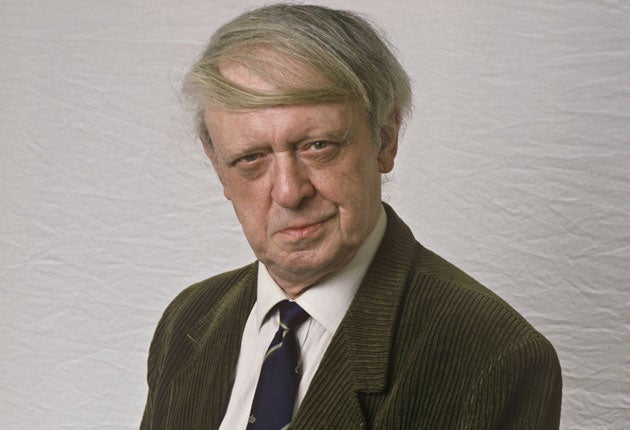Unveiled: Work by Anthony Burgess suppressed for years
The exclusive Malaysian school where the author taught finally allows his ode to be performed

Your support helps us to tell the story
From reproductive rights to climate change to Big Tech, The Independent is on the ground when the story is developing. Whether it's investigating the financials of Elon Musk's pro-Trump PAC or producing our latest documentary, 'The A Word', which shines a light on the American women fighting for reproductive rights, we know how important it is to parse out the facts from the messaging.
At such a critical moment in US history, we need reporters on the ground. Your donation allows us to keep sending journalists to speak to both sides of the story.
The Independent is trusted by Americans across the entire political spectrum. And unlike many other quality news outlets, we choose not to lock Americans out of our reporting and analysis with paywalls. We believe quality journalism should be available to everyone, paid for by those who can afford it.
Your support makes all the difference.When Anthony Burgess returned to Malaysia in 1980 after a gap of 22 years to film an episode of the BBC series Writers and Places, he was not impressed. "The country and I," he announced, "have nothing to say to each other." The author of A Clockwork Orange and Earthly Powers died 17 years ago, but he is still being talked about in the land that launched his career as one of the most celebrated British novelists of the late 20th century. And last night, the capital, Kuala Lumpur, saw a historic royal unveiling of one of Burgess's first works, which was never published. Further, not only had it been forgotten, it had been deliberately suppressed.
"Ode: Celebration for a Malay College" was written while Burgess was a teacher at the Malay College Kuala Kangsar, set up in 1905 to educate the Malay elite in the manner of a British public school and dubbed "the Eton of the East". Then going by his real name of J B Wilson, Burgess composed the verse and its accompanying melody for the college's golden jubilee in 1955, two years before the Federation of Malaya gained independence from Britain.
Within months, however, he had to leave the school after falling out with the headmaster, J D Howell. The following year Burgess published his first novel, Time for a Tiger. A thinly veiled account of his time at Kuala Kangsar, it so cruelly caricatured Howell and his colleagues that, as Burgess recalled in his autobiography, some of those who deemed themselves traduced "sought advice about libel" from a local lawyer.
The ode was swiftly expunged from the school's choral repertoire. "Once he left," says A Rahim Ismail, who was taught by Burgess and is now a retired shipping executive, "we heard nothing of him again." Not even when he became a published author? "His books were certainly not in the library."
A colleague and friend of Burgess's, Yusof Tajuddin, tried to revive the ode under the next headmaster, P G Haig, but Haig's tenure was brief, possibly due to his more liberal approach. Once he had gone, with him went the last trace of that strange, bohemian teacher, then known as J B Wilson. Until last night, that is, when the ode was performed at a Malay College old boys' dinner in Kuala Lumpur in front of two future kings of Malaysia – the Yam Tuan, or ruler, of the state of Negeri Sembilan, and the Raja Muda, or crown prince, of the state of Perak – and the cream of the country's business, political and social worlds.
News of its rediscovery has been greeted with great enthusiasm by the International Anthony Burgess Foundation in Manchester. The ode, said a spokesman, "was part of the very earliest stage of his writing, and so has a literary interest in that it provides context for the first volumes of the Malayan Trilogy. We're delighted that it's being rehabilitated."
The verse, it must be said, offers a clue as to why Burgess was better known for his prose: "We offer our youth, to the world we build / With courage and truth, and love fulfilled / A city will rise that is bright and fair / Into cloudless skies and fresh clean air / Proudly we'll serve and with faith we'll strain / Muscle and nerve and heart and brain / Till wisdom descends like a silver dove / Till evil ends and the law is love." Philip Larkin, it isn't.
Nevertheless, there is now a move for the ode to be made one of the Malay College's official school anthems. As Datuk Syed Danial, who started the campaign to resurrect the ode, which he was taught as a boy during Burgess's time, argued: "No other school has an ode specially written by the world-renowned writer, novelist, essayist and musician Anthony Burgess" – a claim verified by the foundation in Manchester.
As they had no record of the original tune, Mr Rahim wrote a new melody, thus returning a favour that Burgess had once shown him; in 1955 teacher and pupil found that they had a shared love of music, and Burgess wrote a piano accompaniment to a song his pupil had composed.
The ode's revival is fitting, given the debt Burgess feels he owed to Malaya. "The Malay language," he wrote, "changed not just my attitude to communication in general but the whole shape of my mind."
Join our commenting forum
Join thought-provoking conversations, follow other Independent readers and see their replies
Comments